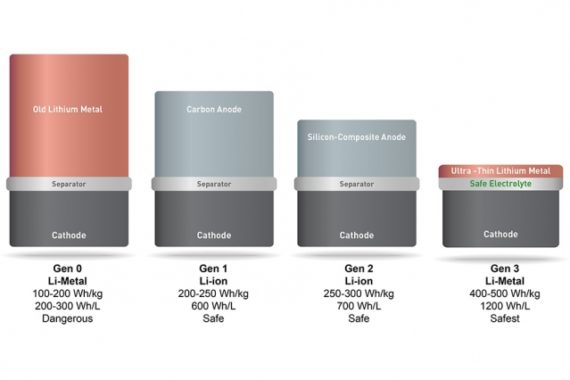The MIT spinoff company SolidEnergy Systems is claiming that it can double the battery life of regular lithium-ion batteries and reduce battery sizes though the use of its new lithium-metal technology.
More specifically, the company is claiming that its battery technology allows for energy densities of 400 Wh/kg. The technology is reportedly also easily integrated with existing manufacturing practices and is nonflammable.
The plan is apparently for the company to go to market in November — with cell phone batteries hitting the market in 2017, and vehicle and drone batteries hitting the market in 2018. Manufacturing is said to have already begun in Woburn, Massachusetts — in a facility that’s, according to those involved, large enough to “house the wings of a Boeing 747.â€
SolidEnergy Systems was formed only very recently, when its founder Qichao Hu was still at MIT. MIT provides some background:
While working as a postdoc in the group of MIT professor Donald Sadoway, a well-known battery researcher who has developed several molten salt and liquid metal batteries, Hu helped make several key design and material advancements in lithium metal batteries, which became the foundation of SolidEnergy’s technology.
One innovation was using an ultrathin lithium metal foil for the anode, which is about one-fifth the thickness of a traditional lithium metal anode, and several times thinner and lighter than traditional graphite, carbon, or silicon anodes. That shrunk the battery size by half. Â
But there was still a major setback: The battery only worked at 80 degrees Celsius or higher. “That was a showstopper,†Hu says. “If the battery doesn’t work at room temperature, then the commercial applications are limited.â€
So Hu developed a solid and liquid hybrid electrolyte solution. He coated the lithium metal foil with a thin solid electrolyte that doesn’t need to be heated to function. He also created a novel quasi-ionic liquid electrolyte that isn’t flammable, and has additional chemical modifications to the separator and cell design to stop it from negatively reacting with the lithium metal.
When taken together, what this all resulted in was a battery solution featuring the energy capacity gifts of lithium-metal batteries and the longevity and safety of typical lithium-ion batteries.
Hu explained: “Combining the solid coating and new high-efficiency ionic liquid materials was the basis for SolidEnergy on the technology side.â€
It sounds promising. We’ve covered many battery tech “breakthroughs†from research institutes over the years, and they often don’t turn into the huge success these institutes make them out to be. However, if this is already going into commercialization, it sounds quite promising.
Source: Cleantechnica



